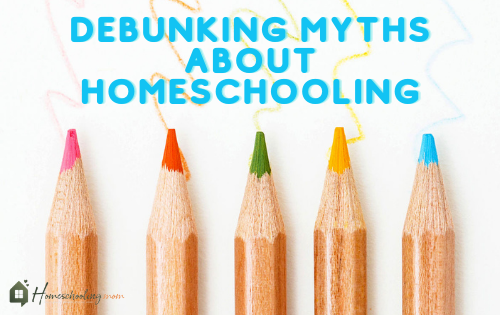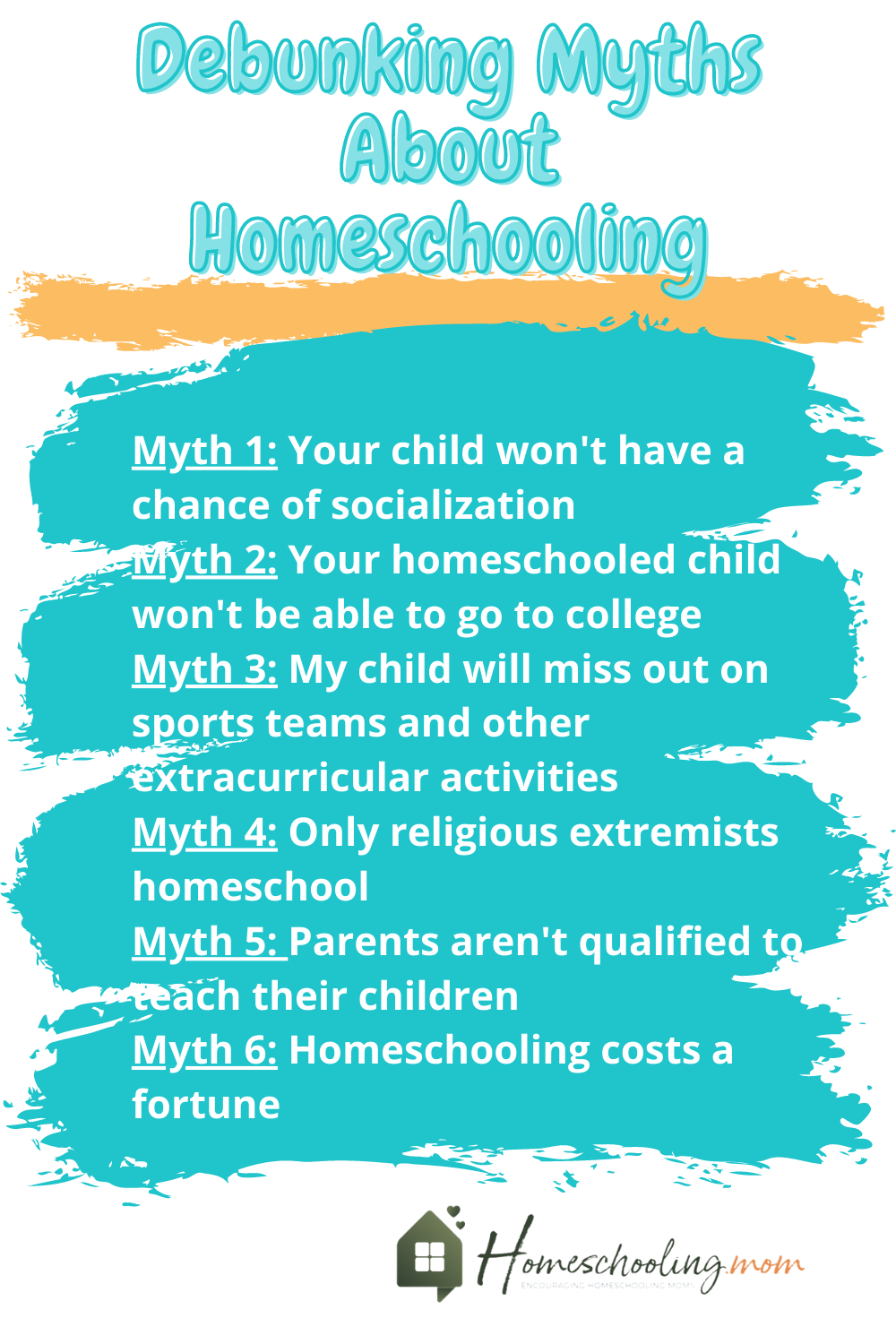Debunking Myths About Homeschooling
Homeschooling is actually an excellent way to educate your child. However, even though many families homeschool, there are still numerous myths that can often cloud the concept of homeschooling. The fact that they exist is troublesome enough, but even worse is the fact that these homeschool myths can cause some parents completely to forego the idea of homeschooling when really, it’s the best option for their child.
If you’re considering homeschooling your child, I want to debunk some of the most popular, most common myths about homeschooling, so you can fairly evaluate the process. After all, you deserve to have more opinions of this beautiful opportunity than those you’ll only hear from the naysayers.

Debunking the Myths about Homeschooling
Myth #1: Your child won't have a chance of socialization
Debunked: Homeschooled students will have plenty of opportunities for socialization
One of the first things you’ll hear is that homeschooled children will not have the opportunity properly to socialize. In fact, it’s something we homeschoolers hear on a regular basis. That’s right, the naysayers will sometimes be so bold as to ask us how we expect our children to learn socialization if we’re always keeping them at home.
The underlying idea seems to be that homeschooling means we keep our kids indoors, behind either a book or a computer screen, and never actually come in contact with other human beings. I do understand there are some absolutely horrific things that have gone on under the guise of “homeschooling” in the past, but 99.99999% of homeschoolers certainly do not fit that mold.
Real homeschooling is about so much more than the curriculum, especially if you choose a method of homeschooling, such as the Charlotte Mason Method or Unschooling. Even in a Classical homeschool education, most such children have more opportunities to socialize than public schooled children.
Think about it from a common-sense standpoint for a moment, if you will. In public school, children are tossed into a classroom with 20 to 40 same-age peers. They have one teacher and, if funding allows for it, sometimes a classroom aid as well. At any given point in the day, these children are all under the authority of usually no more than one or two adults. Unless there’s a field trip, they aren’t taken into the community. They aren’t taught very much, if anything, about contributing to their local region in any way. In fact, everything about public school goes against the very grain of “socialization” as it is defined.
According to the first listed definition by the Merriam-Webster website, socialization means, “the process beginning during childhood by which individuals acquire the values, habits, and attitudes of a society”. We’d like to think that public school instills these values in our young people, but with drag queens offering story hour in the library, bullies pushing our teens and preteens to suicide, and even some teachers interacting perversely with our young children under the guise of “health class”, I fear that the values being promoted are not ones any upstanding parent would want their children to receive, let alone Christian parents.
No, it’s closer to the truth that the socialization our children receive in public school is more closely related to the second definition of socialization: “the action or process of making something socialistic: conversion to collective or governmental ownership and control”. To learn more about how public schools started, feel free to research the writings and teaching of John Taylor Gatto.
Myth #2: Your Homeschooled Child won't be able to go to college
Debunked: Yes, your homeschooled child is capable of being admitted to college
The truth is, your homeschooled child is not only more than capable of getting into a respectable college, but they are also more likely to perform better, make better grades, and sometimes even graduate early. You might even be surprised to find that coveted colleges such as Dartmouth, Yale, and UC Berkeley accept homeschooled children at an astounding rate after having sought them out on purpose. These colleges know that the qualities found in homeschooled children are a perfect fit for their own educational establishments.
Homeschooled children have many unique traits that colleges find less of a gamble than their public schooled peers. For instance, they are self-disciplined, self-motivated, responsible for their own time, and have a deep grounding in their faith. That means they are less likely to find their new independence to be problematic, and they’re less likely to fall into the trap of partying, which often leads to early drop-out rates.
Myth #3: My child will miss out on sports teams and other extracurricular activities
Debunked: Many homeschool communities offer sports and other extracurricular activities
You might hear that homeschooled children have no chance to enjoy sports, debate teams, clubs, and other extras that public schooled children are often a part of. The reality is that homeschooled children are actually much more likely to be a part of those things in their own circles and do very well. It’s not uncommon to see homeschooled children excel towards the Olympics and national teams, as well as finding great success in music, theater, entrepreneurial enterprises, and so much more.
It’s also easier for homeschooled children to take part in group classes and teams since their schedule can easily be adjusted to work those in. Instead of everything falling into the after-school hours, they could easily take a morning class, take care of their studies, and go on to do something else after those studies are over. All without wearing themselves out or missing out on family and friend time.
Myth #4: Only religious extremists homeschool
Debunked: Many secular families, in addition to families of all faiths, homeschool
As I mentioned earlier, there are some instances in which homeschooling is used for more sinister purposes, but this is rarely the case. It’s true that faith-based homeschooling is a very important option for many families, but only because Christianity is constantly being pushed out of the public school system more now than ever before. It is the least accepted religion in the country right now. And Christian parents would like an option to be able to teach their children not only about math and science and social studies but also the faith that means so much to us.
On the other hand, not all homeschoolers are religious at all. There are extensive websites, blogs, and groups that cater to families who homeschool with a secular worldview. Faith-based or religious education doesn’t even factor into their homeschooling curriculum. Many cite their reason for homeschooling to be based on the simple desire for higher quality education for their child.
Myth #5: Parents aren’t qualified to teach their children
Debunked: Parents are best qualified to teach their children because they know them best
Believe me, as a homeschooling parent, I never needed anyone to say this to me. And I’m sure most other homeschool parents would say the same thing. One of the main pitfalls of homeschooling is that we feel like we are failing our children from time to time. Well, what do you know – we’re human!
We are our own worst critics. The truth is, we are our child’s first teacher! From birth on, we are constantly teaching them. First the basics, and then on to more in-depth skills.
The fact is parents are best qualified to teach their children because they know them best. Their strengths, weaknesses, the way they learn, how long they can remain attentive, and at what speed they can process information. These are all things of which we are acutely aware.
Myth #6: Homeschooling costs a fortune
Debunked: You can homeschool on any budget level
I think the better question might be, do some homeschooling parents spend a great deal of money on homeschool curriculum and resources? The answer to that would be yes, but not always for the same reasons. For homeschooling parents who also hold a job (yes, homeschoolers can work and homeschool as well), purchasing a prepacked curriculum complete with lesson plans, grade books, and everything you need to teach each and every subject is a necessary thing. They simply don’t have time to do all the planning and behind-the-scenes work that some homeschool families can do, and so it’s worth it for them to spend a little extra.
At the other end of the spectrum, some homeschoolers spend nearly nothing, if anything at all, by utilizing the ever-growing wealth of cheap and free homeschooling resources and supplies. A simple Google search for “free homeschooling resources” will yield extensive options for homeschoolers anywhere in the world and, in many cases, you can print everything you need.
Read more about how you can homeschool on any budget level here.

In Closing
These are just a few of the many misconceptions surrounding the homeschooling movement. If you know a homeschooler personally, they can probably tell you about some of the ones they have dealt with in their own personal life as well. The good news is, it’s easy to find out the truth. Just contact any homeschooling family, co-op, or curriculum provider and speak with someone for yourself. It’s a great way to find out the broader truths about home education that might just give you the confidence to try it for yourself.
For even more information and a wealth of topics from which to choose to learn about, consider attending a Great Homeschool Convention in your area. Here, you’ll get to hear from experts about many of the topics that are important to homeschoolers all over the country. Attend one of the hundreds of workshops or take advantage of the massive vendor hall, full of curriculum and resource vendors. You won’t be disappointed! Check the website today to find a convention near you!









Stacey Wells
Stacey is an author, blogger, and former homeschool mother who loves to encourage and uplift, especially on the subjects of faith and homeschooling. She lives in Central Kentucky with her husband, Jimmy, and their two children. For more information, visit her website, Words From The Wheel.